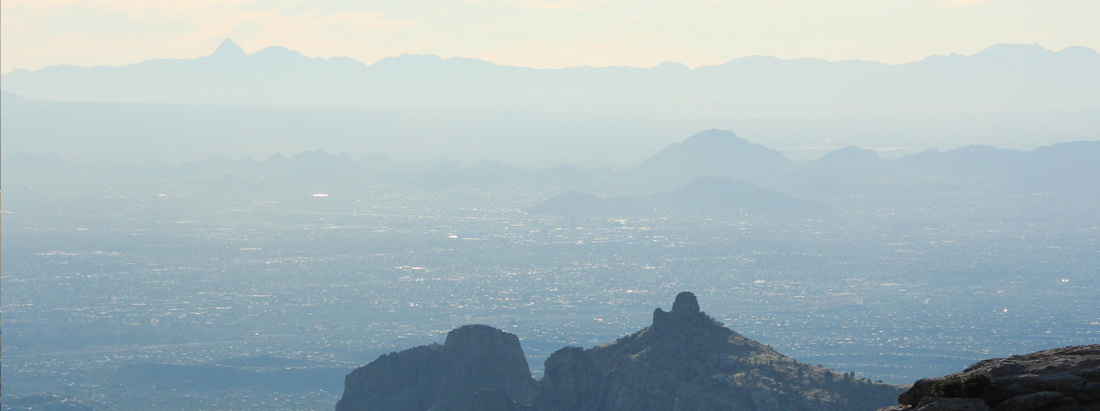College Researchers Contribute to Annual Lancet Countdown Health and Climate Report

The annual Lancet Countdown report, an international research collaboration with The Lancet, one of the world’s leading medical journals, identifies the key health risks and negative health impacts caused by climate change. Dr. Mona Arora and Dr. Kacey Ernst from the Zuckerman College of Public Health participate in the U.S. working group that helps to produce the report and highlight climate-driven public health challenges.
The annual Lancet Countdown: Tracking Progress on Health and Climate Change report, an international research collaboration with The Lancet, one of the world’s leading medical journals, analyzes the negative health impacts and health risks caused climate change. Mona Arora, PhD, MSPH, and Kacey Ernst, PhD, from the Zuckerman College of Public Health at the University of Arizona, are both members of the Lancet Countdown working group in the United States, a team of experts from over 80 institutions, organizations, and centers that helps to produce the U.S. report and highlight climate-driven public health impacts for communities and populations around the country. The 2022 Lancet Countdown will be released on Wednesday, October 26.
“This annual report brings together so much knowledge and expertise, and it effectively tracks the health impacts of climate change,” says Dr. Arora, “with a focus on highlighting inequities. The report also highlights opportunities for action and provides key policy recommendations that are centered around health and equity.” vital information that helps public health professionals, government leaders, and communities make the best fact-based decisions to keep people health and safe as climate change intensifies.”
The Countdown report was launched following the 2015 Lancet Commission on Health and Climate Change, which concluded that unmitigated climate change would undermine 50 years of public health gains, and that conversely, an effective response to climate change risks could represent “the greatest global health opportunity of the 21st century.”
The Global Report and the U.S. Brief have become highly anticipated annual releases, and garner significant media attention and engagement with policymakers. The U.S. Brief draws out the most nationally relevant findings to highlight the key threats and opportunities climate change poses for health in the United States. The U.S. Brief is developed in partnership with the American Public Health Association and a working group of experts in the climate and health field, which includes over 70 organizations and institutions.
Working group members, including Dr. Arora and Dr. Ernst, begin strategizing on the U.S. Brief in late spring. First the group prioritizes theme areas and focus indicators based on research and current events such as the COVID pandemic and recent climate crises. They then refine policy recommendations and contribute to the design of accompanying materials. Finally group members thoroughly review the drafts to ensure the latest scientific research is faithfully represented and that the Brief captures the most critical health issues.
The Zuckerman College of Public Health recognizes the growing health risks from climate change, in Arizona and around the world, and we are determined to use our public health expertise to reduce the risks, support communities, and find health solutions.
“I’m so pleased that Dr. Arora and Dr. Ernst are part of the Lancet Countdown working group,” said Iman Hakim, “as our climate changes the health risks from heat and floods and fire continue to grow, along with the risks of food and housing insecurity, often for those with the fewest resources. We have to be ready to meet these challenges and help communities with the knowledge and expertise that public health provides.”
![]()
Climate Change Workshop in November
To build knowledge and expertise around the health risks and impacts of climate change, Dr. Arora and Dr. Ernst have organized a day-long workshop, COVID, Climate Change, and Preparedness: Lessons Learned. Hosted with support from the UArizona’s Center for Climate Adaptation Science and Solutions, the University of Arizona Health Sciences’ Aegis Consortium, the Southwest Environmental Health Sciences Center and the Bridging Biodiversity and Conservation Science group, the workshop will bring together experts from the public health and healthcare community across Arizona and nationally to discuss and develop public health strategies and solutions for climate-driven health challenges. The workshop will take place on Friday, November 18, 8:30am to 5:30pm. Participation is open to all, and students are especially encouraged to attend, but spaces are limited so register now.

